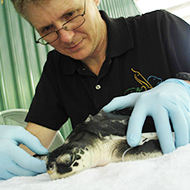
Dr Michael Ziccardi to lead the OHI into its next phase.
Wildlife vet and epidemiologist Dr Michael Ziccardi has been appointed executive director of the One Health Institute (OHI) at the University of California, Davis, School of Veterinary Medicine.
Dr Ziccardi will serve a five-year-term through to July 2025, leading the OHI in its mission to solve complex problems impacting health and conservation such as zoonotic disease emergence, food insecurity and biodiversity loss.
The largest research centre in the UC Davis School of Veterinary Medicine, the OHI has been at the forefront of the global response to COVID-19, providing legislative guidance in the U.S. as well as laboratory support and workforce training in some of the least resourced regions of the world.
Commenting on his appointment, Dr Ziccardi said: “This new leadership opportunity is truly an honour. In the midst of the COVID-19 pandemic, society has experienced first-hand the key importance of pursuing large-scale issues with a One Health focus, as well as the amazing expertise and cutting-edge science that OHI staff and faculty continues to bring to the problem.
“I look forward to helping keep the OHI at the forefront of critical global health issues, and also exploring how we can better use our skills to address other societal problems.”
Dr Ziccardi holds a doctorate in veterinary medicine, a master’s degree in preventive veterinary medicine and a PhD in epidemiology. As a Professor of Clinical Wildlife Health in the Department of Medicine & Epidemiology, Ziccardi also teaches globally on wildlife health and conservation.
Dr Ziccardi maintains an active research program investigating emergency response involving animals in crisis and the One Health effects of petroleum in the environment. He currently serves as Chair of the NOAA Working Group for Marine Mammal Unusual Mortality Events as well as the industry-funded Global Oiled Wildlife Response System.
Jonna Mazet, founding executive director of the One Health Institute, commented: “I enthusiastically welcome Dr Michael Ziccardi as the OHI’s new leader. I anticipate great success as he leads the OHI into its next phase, pursuing a healthier, more equitable and more sustainable future for humanity and the planet.”
Image (C) UC Davis.



 RCVS Knowledge has called on vet practices to audit their post-operative neutering outcomes.
RCVS Knowledge has called on vet practices to audit their post-operative neutering outcomes.